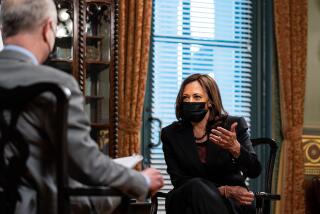Generalities Instead of Details : Bush Ends Strategy Talks; Cautious Campaign Likely
- Share via
KENNEBUNKPORT, Me. — Vice President George Bush wrapped up six days of meetings with policy advisers and political aides on Wednesday, signaling that he remains committed to a cautious campaign strategy relying on generalities more than detailed programs.
In briefings Tuesday and Wednesday, the vice president, his aides and policy experts suggested that specific campaign proposals will be announced slowly over the coming months--at a pace chosen by Bush himself.
Fiscal advisers said Wednesday, for example, that programs that Bush might target for budget cuts under his 3-month-old budget plan may not be identified before the election.
Holding a ‘Trump Card’
“There’ll be some increases and there may be some offsets in other areas,” said New Hampshire Gov. John H. Sununu, a senior adviser and a participant in the six days of sessions. “That is part of what I think the vice president should hold as his trump card.”
In another refinement that could prove controversial, Bush economic adviser Martin Feldstein suggested Wednesday that Bush’s plan to balance the budget rested partially on the presumption that deficit-cutting efforts would themselves lead to lowered interest rates.
Feldstein said a 2% decline in real interest rates would cause a savings of $55 billion each year in interest payments on the national debt. “So it really is do-able,” he said.
Bush has come under fire from fellow Republicans because of a widespread perception that he has been too slow to define himself to American voters. The grumblings, bolstered by private agreement among some staff members, has escalated as Bush has plummeted in recent polls.
But, meeting with reporters Tuesday, Bush declared himself unmoved by the public pressure.
“I feel under no great urgency, spelling out these themes. . . . I don’t feel the compulsion to give, you know, 20-point programs on that,” Bush said.
Bush Not Worried
The vice president declared that he was “not in the least” worried that he would endanger his candidacy by refusing to immediately lay out specifics.
The sessions, conducted at Bush’s seaside mansion here, were meant to firm up positions as Bush enters the post-primary, pre-convention campaign season.
On Sunday and Monday, Bush and his political aides mapped out campaign strategy.
Participants described the sessions as wide-ranging and somewhat blunt, although no new policies emerged outright. “These discussions were not deferential discussions at all,” Sununu said. “They were hard give-and-take.”
Grass-Roots Concerns
Among domestic issues, an emphasis on topics such as day care and early childhood education showed the campaign’s growing recognition that it must come to terms with grass-roots concerns.
Thus far in the campaign, perceptions persist among voters that Bush has difficulty relating to average Americans. Although he undeniably has a blue-blood background, Bush has been trying in recent weeks to forge a connection to middle-class Americans based on issues rather than personal experience.
“I think we’re talking about education,” Bush said in summing up what he learned in the meetings. “Everything almost ties back into education.
“The kids of this country--we’ve got to do more for them. We’ve got to assure they have a chance, an equal chance at the starting line,” he said.
“Invest in our kids,” he added later, trying out a campaign theme. “I like it.”
Reagan Policies Rebuked
Although Bush has been loath to criticize President Reagan, advisers tacitly acknowledged that the emphasis on education is a subtle rebuke to Reagan’s policies.
“We’ve learned from the mistakes of previous policies,” Illinois Gov. James R. Thompson, another participant, said.
There appeared less potential for the development of new economic themes, as Bush basically reiterated support for announced positions--a ban on federal tax increases, support for the line-item veto and the establishment of a “flexible” budget freeze.
The freeze plan would allow Bush to increase spending for certain programs as long as he cut spending by a comparable amount on other programs. He has listed programs he would increase--funding for AIDS and the environment, for example--but he has refused to detail programs that could be cut.
No Social Security Cuts
His advisers Wednesday said also that no consideration was given in the budget discussions to raising taxes or cutting either Social Security or the defense budget, because of Bush’s opposition to such moves.
Strategically, Bush made clear in the meetings that he will continue to hit hard at Massachusetts Gov. Michael S. Dukakis, as he has increasingly since Dukakis emerged as the almost certain Democratic nominee.
More to Read
Get the L.A. Times Politics newsletter
Deeply reported insights into legislation, politics and policy from Sacramento, Washington and beyond. In your inbox twice per week.
You may occasionally receive promotional content from the Los Angeles Times.










